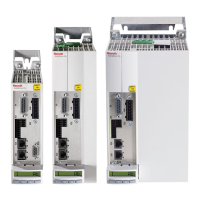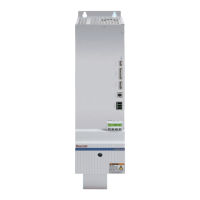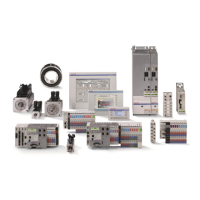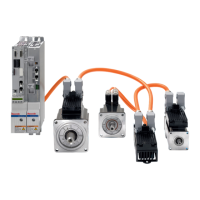Rexroth IndraDrive Determination of Appropriate Power Supply Units 8-7
DOK-INDRV*-HMV-*******-PR01-EN-P
z*h*g*mW
pot
=
W
pot
: potential energy [Ws]
m: load mass [kg]
g: gravity constant = 9,81 m/s²
h: drop height [m]
z: number of drops per cycle
Fig. 8-20: Potential energy of non-compensated masses
z
rotgpotg
RD
t
WW
P
+
=
BDRD
PP ≤
P
RD
: continuous regenerated power [kW]
P
BD
: continuous bleeder power [kW]
t
z
: cycle time [s]
W
potg
: sum of potential energy [kWs]
W
rotg
: sum of rotary energies [kWs]
Fig. 8-21: Continuous regenerated energy
8.6 Peak Regenerated Power
The peak regenerated power usually arises, when an Emergency Stop
signal has been released and all the axes brake simultaneously.
CAUTION
Property damages due to longer braking
periods/paths!
⇒ Choose the power supply unit such that the sum of
the peak regenerated power of the all drives does not
exceed the bleeder peak power of the power supply
unit.
The peak regenerated power of the servo drives is listed in the motor
selection documentation.
Roughly estimated, the peak regenerated power can be calculated as
follows:
25,1*9550
n*M
P
maxmax
RS
=
∑
≤
BSRs
PP
P
RS
: peak regenerated power [kW]
P
BS
: peak bleeder power [kW]
M
max
: max. drive torque [Nm]
n
max
: max. NC usable speed [min
-1
]
1,25: constant for motor and controller efficiency
Fig. 8-22: Peak regenerated power

